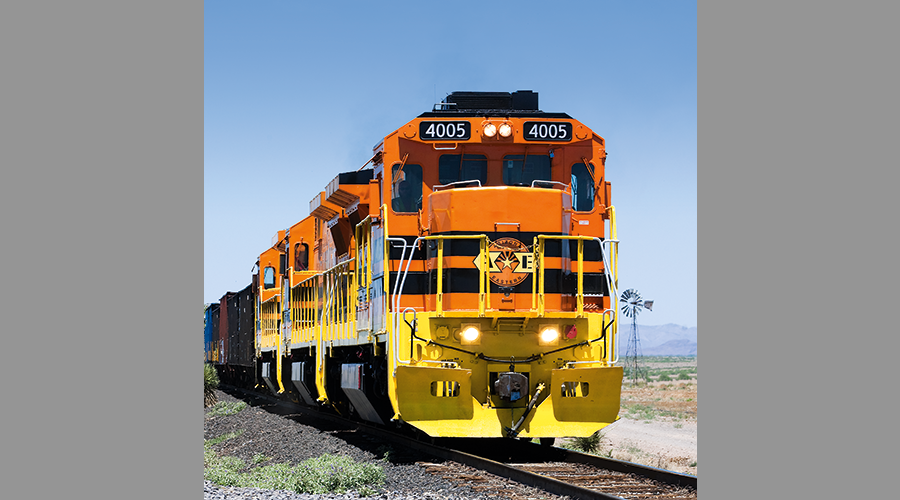Stay updated on news, articles and information for the rail industry
April 2008
Rail News: Short Lines & Regionals
‘Green’ all the way in L.A.
Pacific Harbor Line Inc. (PHL) is moving to the head of the short-line class on two counts. The railroad not only has become the first short line to join the U.S. Environmental Protection Agency’s (EPA) SmartWay Transport® Partnership, but soon will be the first to operate an all-environmentally friendly locomotive fleet.
The 70-mile PHL, which serves the ports of Los Angeles and Long Beach, Calif., is marking those milestones while taking aim at reducing air emissions. One of the prime objectives calls for replacing the railroad’s fleet of 16 locomotives with clean-diesel units. The short line provided $10 million, the ports contributed $5 million each, and California’s Carl Moyer Memorial Air Quality Standards Attainment Program funded $3 million for the fleet makeover.
Remanufactured by Wabtec Corp. subsidiary MotivePower Inc., the 14 six-axle and two four-axle locomotives will be equipped with new 2,000-horsepower Detroit Diesel engines designed to exceed the EPA’s Tier 2 emission standards. PHL has taken delivery of 13 units and will obtain the remainder by April’s end.
Southern (dis)comfort
In 1997, the L.A.-area ports purchased track from the Atchison, Topkea and Santa Fe, Southern Pacific and Union Pacific railroads, and contracted PHL owner Anacostia & Pacific Co. Inc. to operate the line. Since then, efforts to reduce emissions have intensified in southern California, a region sporting millions of automobiles, trucks and diesel-powered machines.
The two ports comprise the world’s fifth-largest and western hemisphere’s largest port complex. Last year, the ports’ volume reached 15 million 20-foot equivalent units, of which PHL handles about 80 percent. The short line also moves 30,000 to 40,000 cars annually for 29 other customers in the port area.
Efforts by PHL and the L.A. port to obtain the environmentally friendly switchers began in 2003.
“A member of the environmental staff of the port contacted us about a program in which they had to subsidize the replacement of power plants on commercial harbor craft,” says PHL President Andrew Fox, adding that L.A. port officials believed the railroad presented the next-best opportunity to improve air quality in the area.
The short line then devised the deal structure, selected the locomotive manufacturer, and brought the Long Beach port and South Coast Air Quality Management District’s Carl Moyer program funds on board, he says. The Carl Moyer program provides incentive grants for obtaining cleaner-than-required engines and equipment.
The short line also has taken other steps to bolster its environmental stewardship, such as joining the EPA’s voluntary emission-reducing Smartway program — of which all the Class Is are members — last year to demonstrate a commitment to improved air quality, says Fox. In addition, PHL changed operating practices to reduce idling, a move that’s helped cut fuel usage by 20 percent.
“We took advantage of the mild southern California climate to eliminate unnecessary idling,” says Fox. “If a locomotive is not going to move within 15 minutes, the crew shuts it down.”
PHL also obtained emission-friendly crew vehicles, including hybrids, and replaced pick-up trucks with electric golf carts.
The short line expects to further “green up” its locomotive fleet by acquiring two additional generator-set (GenSet) switchers by April’s end. The short line already is using three National Railway Equipment Co. GenSets, which are designed to reduce nitrous oxide and particulate matter emissions by 80 percent or more, and cut fuel usage more than 50 percent compared with a conventional switcher.
And there’ll be another item on PHL’s air quality agenda shortly after the short line takes possession of all GenSets and remanufactured locomotives.
“We want to look at additional opportunities for improvements in the after-treatment of exhaust gases,” says Fox.
— By Walter Weart, a Denver-based free-lance writer.
CONTENTSPacific Harbor Line |
Keywords
Browse articles on Pacific Harbor Line short line short line railroadContact Progressive Railroading editorial staff.


 LRW Honors Amtrak’s Acheson As Railway Woman Of The Year
LRW Honors Amtrak’s Acheson As Railway Woman Of The Year
 From Editor-In-Chief Foran: Of Gender Equity And Inclusion
From Editor-In-Chief Foran: Of Gender Equity And Inclusion
 Spotlight On Some Of Today’s Rail Safety Products
Spotlight On Some Of Today’s Rail Safety Products
 Women of Influence in Rail eBook
Women of Influence in Rail eBook
 railPrime
railPrime








